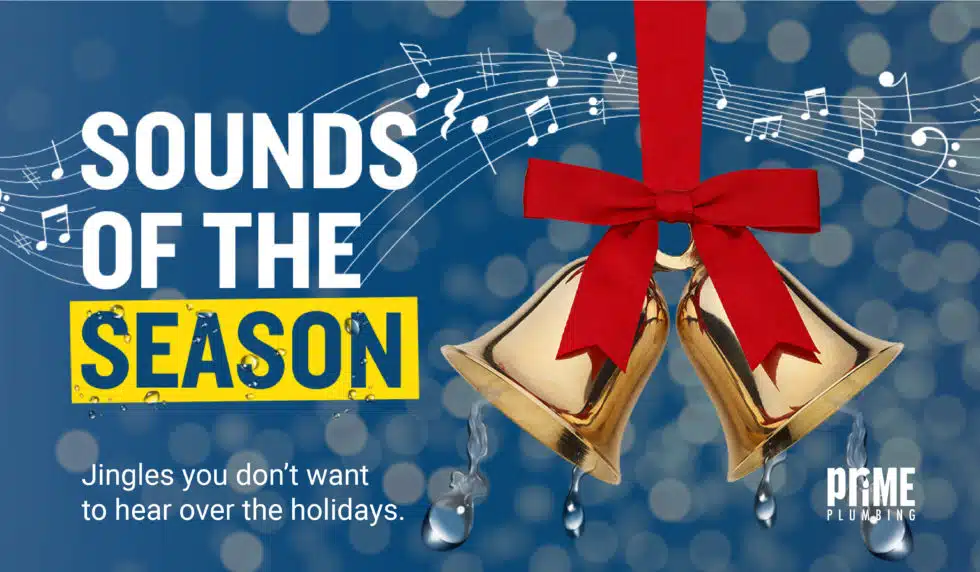Service 7 Days a Week

Proudly Serving Central Maryland
Sounds of the Season: Jingles You Don’t Want To Hear Over the Holidays

Save Time, Call Prime!
The holidays may be the most wonderful time of the year, but an unexpected problem with your plumbing is bound to leave you feeling anything but merry and bright. However, we want you to know that if the sounds of sleigh bells are being silenced in your home by tones of drips and gurgling, you aren’t alone. In fact, the holidays are one of the most problematic times of the year for plumbing systems due to factors like an increase in houseguests and chillier temperatures.
Read on as we run down the sounds of the season you DON’T want to hear — and what you can do to fix the problem.
Gurgling from the drain
Most people assume that a little drain gurgling is normal. A gurgling sound coming from a drain is an indication that a clog has formed somewhere in the line, and water is struggling to pass through. A clog that’s not addressed will only grow with time and lead to issues much more severe than an unpleasant gurgle.
The first thing you should do is a visual inspection to look for a blockage, like food, debris, or hair. Next, you’ll want to use a snake — a long, flexible cable affixed with an uncoiled spring — to dislodge the blockage. If a snake doesn’t work, you can also try a plunger. Both a snake and a plunger can be purchased from any hardware or big-box home improvement store, and both are easy to use.
For any drain clog assistance or inspection services, Prime Plumbing is here to help this holiday. Call 443-741-1129 or contact us online to schedule your local Maryland plumbers!
Drips from the faucet
Once you hear it, you won’t ever be able to unhear it. Leaky faucets are an incredible waste of money at a time of the year when a lot of us are pinching pennies to buy that perfect gift for someone special.
There are many different reasons a faucet might leak, from bad washers and cartridges to worn-out seals and water pressure woes. To fix the problem, start by doing a little investigating. After you turn off the water supply by shutting off the valves under the sink, plug the drain and remove any decorative parts that cover the handle knobs. After, look for any parts that are damaged or nuts that need tightening. Lastly, replace the washer and O-ring, and reassemble the faucet. Chances are that tune-up will get the job done — but if not, you may need professional help from a plumber.
Schedule your tune-up and keep your home holiday-ready this season. Contact us online or call 443-741-1129 and leave it to the professionals at Prime Plumbing!
Running water from the toilet
Remember that influx of holiday houseguests we talked about earlier? Well, the toilet is definitely one of the fixtures that get used the most as a result. Toilets aren’t the most complex part of a home’s plumbing system, but there are a few different parts that can become faulty and cause the toilet to run endlessly.
You’ll want to first check the water level in the tank to determine if it’s running into the overflow tube. If it is, the water level should be corrected through an adjustment of the screw that attaches to the float fill valve by turning it a quarter-turn counterclockwise until the water level is about an inch below the top of the overflow tube. You should also inspect the flush valve chain to ensure its length is adequate so the flapper can open and close properly. While you’re there, give the flapper a look as well to ensure it’s structurally sound.
Video: How To Stop A Running Toilet
Whistling from the faucet
Whistling along to “Jingle Bells”? That’s good. Whistling coming from the faucet? That’s bad. This common complaint from homeowners is usually due to water being forcefully pushed through an opening much smaller than what the plumbing components were designed to support (meaning the pressure is too high). It could also come from a rubber washer that has become dislodged or a collection of buildup from hard water. In any event, the whistle or squeal is likely to intensify as the water pressure increases.
The simplest way to check your water pressure is to connect a pressure gauge (these are readily available at the same stores where you’ll find snakes and plungers) to an outdoor spigot. If the pressure is higher than 60 psi, it’s too high. Adjusting the pressure can be tricky, so calling a plumber to help may not be a bad idea. To fix a dislodged washer, turn off the water supply and unscrew the faucet nozzle. You should be able to correct the washer’s positioning from there by hand. As for a collection of hard water, you can remove the faucet from the sink and clean with a toothbrush and white vinegar. That said, hard water doesn’t just go away on its own, so you may want to invest in a whole-home water softener.
Our wish is that the only sounds you hear this holiday are laughter and merriment — but if you do happen to pick up on one of the sounds we covered above, Prime Plumbing is here when you need us. Save time, call 443-741-1129 or contact us online!
The Difference With Prime
Get a FREE second opinion on water and sewer service, and septic repair/replacements!
Don’t Just Take Our Word for it

Why Choose Prime Plumbing?
Professional Services at an Affordable Price
- Transparent Pricing
- No Additional Charges for Overtime
- Flexible Financing Solutions
- Thorough Employee Background Checks
- Complimentary Second Opinions

